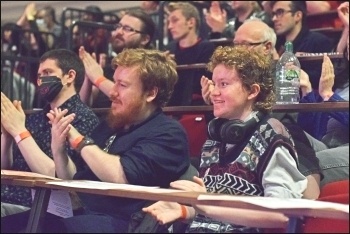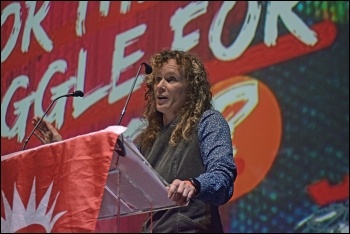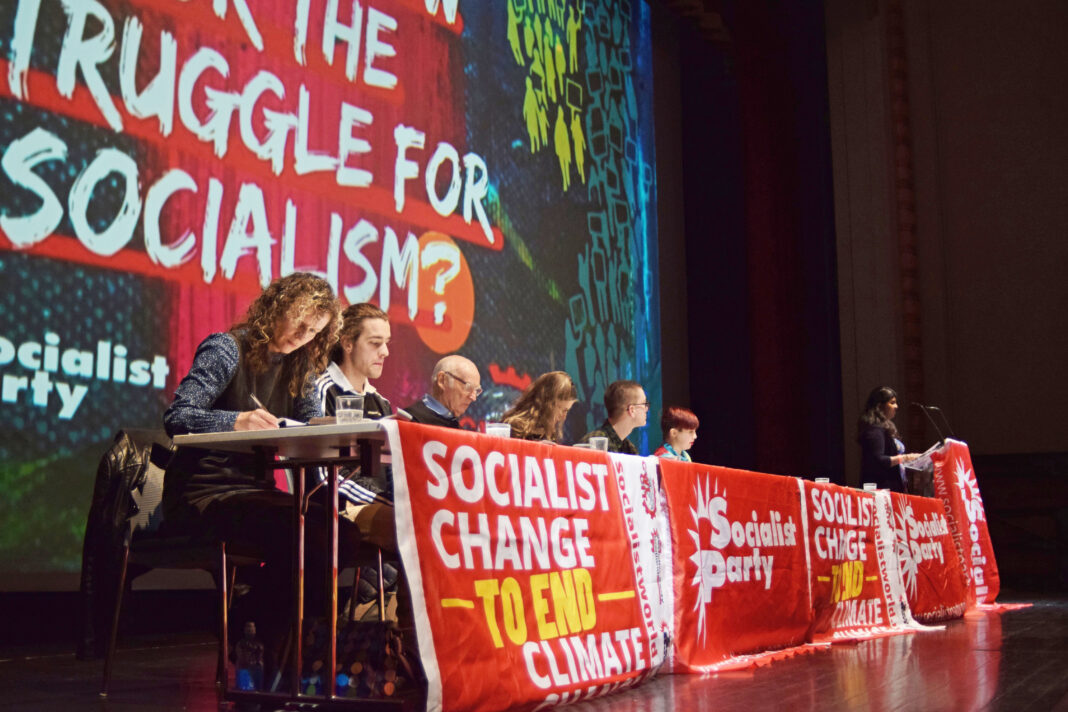Sarah Sachs-Eldridge, Socialism2021 organiser
Socialism 2021 brimmed with determination. Determination to overcome the obstacles of time, resources, technical hitches, and the pandemic; to meet and discuss socialist ideas and Marxism. Determination to build workers’ and youth struggles, determination to build our party, and determination to fight to transform society in a socialist direction.
The proof of this was the response to the weekend’s appeal for financial support for the fight for socialism. The ambitious target of £30,000 was dwarfed by the £47,221.79 pledged in response!
A special clap went up to acknowledge the donation from one of the venue staff who is also now among those convinced to join the Socialist Party by what they heard and discussed at the weekend.
Last year, Socialism2020 was ‘virtual’. This year, around 400 met in person, with a similar number joining online. The weekend comprised an online introduction on Friday evening followed by 39 workshops on ten themes, with a major rally on Saturday afternoon.

Part of the Saturday rally audience, Soc21, photo by Mary Finch
Everywhere you went there was a buzz of discussion – from the workshops, to the bookshop, to the bar. Being back in person, for those of us who could, felt fantastic.
This was not the first in-person activity for the Socialist Party since the pandemic – far from it. Many members and branches were coming fresh from leading campaigns in the workplaces and communities, from organising and supporting strikes and protests, or from building support for socialist ideas among young people in colleges and on campuses.
All of that experience fed into the discussion, which in turn will strengthen our ability to offer a way forward in those struggles – and the even bigger ones to come.
The new elements – masks, covid tests and uniting ‘roomers and Zoomers’ in the discussion – are the visible expressions of the ‘new normal’ of 2021. So was the need to discuss the new level of attacks on all the past gains of the working class, such as the bosses’ ‘fire and re-hire’ and the threat of lowering the threshold for student debt repayments.
But even more expressive of the new era was the large number of people attending their first Socialism event, their desire for an alternative to the rigged and rotten system sharpened by the experience of the pandemic, and all the ways the capitalist crisis impacts lives and the environment.
The main rally on Saturday brought all of the themes of Socialism 2021 together. Isai Priya, Socialist Party national treasurer and rally chair, opened up welcoming the hundreds in the hall and those watching on YouTube.
The theme of the rally, as she explained, was ‘Our future at stake – what now for the struggle for socialism?’ Isai pointed to the fightbacks against exploitation and oppression breaking out all round the world as the backdrop to the rally.
Oisin Duncan, a youth organiser for Socialist Party Scotland (SPS), reported how, in recognition of the failure of the capitalist representatives at COP 26, Greta Thunberg’s ‘blah, blah, blah’ line is now postered all over Glasgow. He described the interest among young people on the protests, and workers on the picket lines that SPS supported, in the call for building a working-class movement for socialist change to end climate change and capitalist chaos.

Oisin Duncan speaking to the Socialism 2021 rally, photo by Mary Finch
Judy Beishon from the Socialist Party’s executive committee, explained how it is the capitalist system itself that means the 26th COP, like the 25 summits before, was incapable of agreeing anything more than small, inadequate steps.
Capitalism’s inbuilt workings make it incapable of the urgent action, investment and cooperation, including internationally, that is necessary to halt climate change – because it’s based on the competition between nation states and capital accumulation for private profit through exploitation of workers and natural resources.
But Judy’s was an optimistic contribution because she pointed to another accumulation – that of all the factors that can contribute to the very rapid building of mass working-class organisations with socialist programmes. The conditions are also developing for an international expression of this, given the very rottenness of capitalism everywhere in the world.
Militant working-class organisation was the theme taken up by the next two speakers, well placed as trade union general secretaries, both elected recently on fightback programmes.
Carmel Gates is a longstanding member of the Socialist Party’s sister party in Ireland (Militant Left) and the general secretary of the Northern Ireland Public Service Alliance (Nipsa) trade union.
Carmel expressed confidence in her greeting in workers’ growing willingness to fight including, and importantly, young workers. She pointed to what’s needed to organise in Northern Ireland, explaining that Nipsa stands for a socialist economy and for cross-community, working-class, non-sectarian trade unionism.
Speaking to the rally via video, Unite the Union general secretary, Sharon Graham said that in order to defend jobs, pay and conditions, the union is involved in more industrial disputes than at any time in its history; that she stands with striking workers on the picket lines (where she had just come from); bringing reps together across industries, like road haulage, to build practical plans to push back on suppression of pay; instructing the union’s lawyers to fight for reps so they can defend members; and building a disputes unit that will triple in size over the next months.

Sharon Graham speaking to the Soc21 rally, photo by Mary Finch
Like the Socialist Party, Sharon argues for the trade unions to play a central role in working-class struggle – coordinating across unions and internationally as well as organising in communities to take on the landlords and the councils.
The president of the bakers’ union (Bfawu), Ian Hodson, spoke of the conclusions his union had reached on the Keir Starmer leadership of the Labour Party. Ian very effectively compared the political landscape today to that which existed when the union joined the recently founded Labour Party in 1902.
Then, the Liberal Party claimed to be the only option for the working class, but its only offer was ‘to raise workers’ expectations’; while the King’s charity was feeding half a million poverty stricken people.
But after 121 years of having a party that was representative of our class, today a footballer is feeding workers’ kids and Starmer can’t even stick to his promise to the unions of supporting £15-an-hour minimum wage!
Ian outlined the programme of workers’ demands to fight for – as well as a £15-an-hour minimum wage, permanent contracts for all, like the McDonald’s workers won through strike action, and building a million council homes.
How can anyone who claims to be the leader of Labour, of the working class, be a ‘sir’, asked Peter Taaffe, the political secretary of the Socialist Party.
In his contribution, Peter laid bare the complete incapacity of those in charge today, the lords of finance and capital, the capitalist class, to solve the problems of the world.
Their system is based on lust for profit; a barrier to taking society forward today. He encouraged all in attendance to study Marxism and all the lessons of the struggles of the Socialist Party, including the history of our party.
Peter made the case for internationalism compellingly – of working-class internationalism, with a programme for collaboration, negotiation and cooperation through voluntary confederations of socialist countries. That’s why we build the Committee for a Workers’ International (CWI)), the worldwide socialist organisation to which the Socialist Party is affiliated.
Peter was followed by a short greeting from Abbey Trotsky, a CWI member in the Socialist Party’s sister party in Nigeria, the Democratic Socialist Movement (DSM).
Capitalist crisis in Nigeria threatens the unwinding of society and demands a socialist fightback, which Abbey and our comrades are heroically fighting to build. A DSM member, a student activist, was recently murdered and Abbey himself is facing numerous court cases to intimidate him and others from fighting to defend workers against casualisation and exploitation.
Max McGee from Nuneaton Socialist Party branch is one of the growing number of trade union reps facing victimisation as bosses in Britain try to weaken workers’ ability to fight back.
Max is under attack because in the warehouse where he worked he fought to demonstrate socialist trade unionism: to represent workers as he would want representation; to encourage branch participation; and by showing that when we fight we can win, beating back unsafe working practices with collective organisation.
Max’s unfair dismissal coincided with him delivering an indicative ballot for strike action for the first time in the warehouse’s history. He is enjoying solidarity from those workers who recognise his role.
Hannah Sell, Socialist Party general secretary, gave the final keynote speech of the rally, pulling all the many important threads together.

Hannah Sell addressing the Socialism21 rally, photo by Mary Finch
The fact that a big majority of young people in Britain today consider themselves socialist is no accident, but nor is it only down to Jeremy Corbyn. The main driver is the experience of brutal capitalism and its inability to offer a future for people or the environment.
Hannah referred to Friedrich Engels, the co-founder of scientific socialism with Karl Marx.
Engels had drawn out how the very contradictions of capitalism and the resulting crisis, objectively raises the need for socialist policies, the “invading socialist revolution.”
The rapid development of Covid vaccines disproved the capitalist lie of the ‘free market’. Government intervention – to the tune of billions – was key.
However, as Hannah explained, while socialism is lodged in the situation, a new socialist order is not pre-ordained. It is certainly necessary and also possible – and the working class collectively is the force capable of ending capitalism and introducing that new socialist order.
But right now, largely as result of right-wing trade union leaders’ inaction, many workers feel powerless to fight back in their own workplace, let alone to change society. The lack of a mass party that is fighting on our side is also a key factor.
Nonetheless, we are at the start of a new phase of struggle and increased confidence and combativity of many workers – as indicated by the strike waves across the US, the victory of farmers in India against Modi, determined strikes here in Britain, and also the election of left trade union leaders.
These examples of workers’ struggles are not only a response to the bosses’ offensive, but also reflect how the pandemic created an increased understanding of who really runs society – the working class.
Another vital role of the Socialist Party, alongside fighting to increase militancy in the workplaces is to fight for a voice in the political field.
Such are the sleaze and splits that the Tory government is drowning in, Hannah argued that we can’t rule out, despite Starmer’s uselessness, a Labour government being thrust into power.
Obviously, millions would be relieved to get rid of the Tories – but ‘Sir Kier’ has made it abundantly clear, including through his resuscitation of Blairism at the same Labour conference where he rescinded his £15-an-hour minimum wage commitment, that he acts in the interests of the capitalist class.
But unlike Blair, in this era of capitalist crisis, big business would expect him to make far more savage attacks on the working class, and very soon Labour would face mass disillusionment and opposition.
However, the political vacuum that would leave, in the absence of a new mass workers’ party being built, poses the real danger of right-wing racist forces trying to step in to harness workers’ anger.
Hannah commended Ian and the bakers union for the principled stand they’ve taken – recognising that disaffiliation from Labour is necessary, but also new forms of workers’ politics, something Sharon has also raised, is needed. How that’s built will need discussion, but in the view of the Socialist Party, it means stepping outside the moribund Labour Party.
Hannah offered trade unionists wanting to represent their class against the bosses in elections, as they do in the workplace, to stand under the no-cuts banner of the Trade Unionist and Socialist Coalition which the Socialist Party, along with the RMT transport union and others, participates in.
She pointed to the motion voted through at Unite conference to call on councils to set ‘needs-based, no-cuts budgets’. This commitment needs to be linked to a fighting campaign to get the money needed off the Tory government.
Hannah concluded by making the case for joining the Socialist Party, the hardest fighters in the workplaces, communities and in the steps towards the working class having its own political voice – but also for a socialist programme that will be necessary for the mass movements coming down the line to successfully transform society in a socialist direction.








